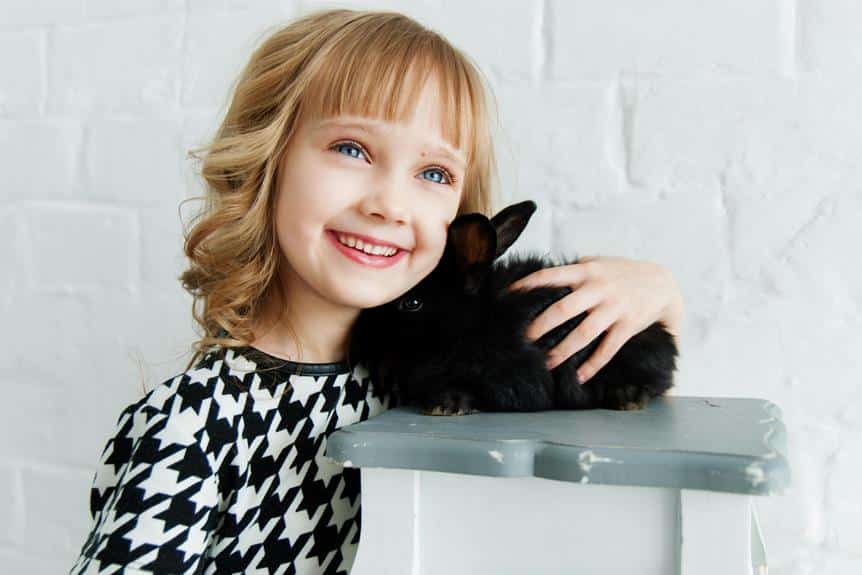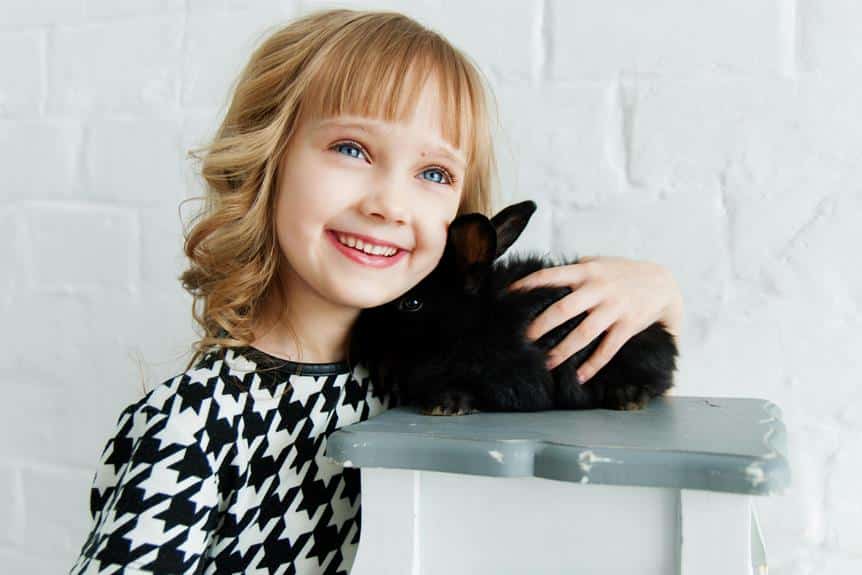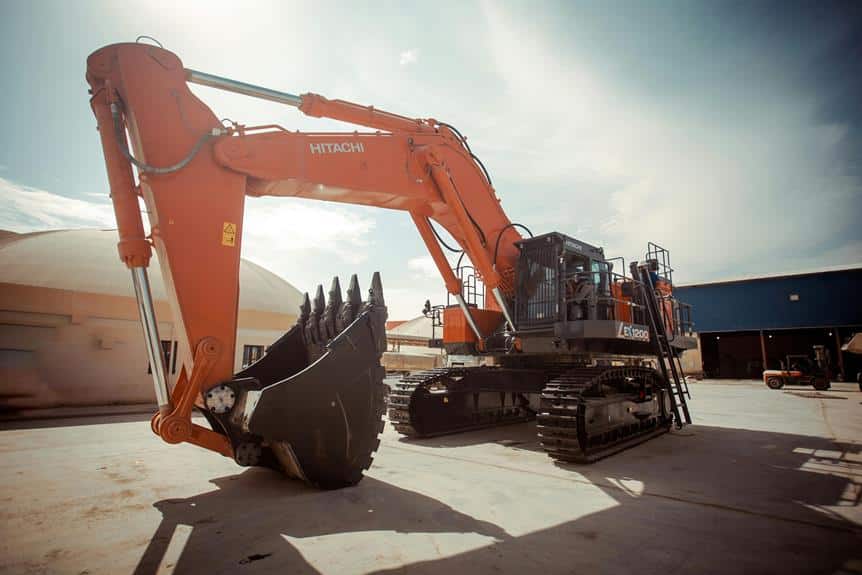Table of Contents
Imagine your pet rabbit’s digestive system as a well-oiled machine – always working efficiently to break down food and extract nutrients. However, without the proper fuel, this machine can quickly break down and cause a multitude of health issues. Just like a car needs gasoline to run, your rabbit needs a high-fiber diet to maintain a healthy digestive system.
A high-fiber diet is like a superhero for your pet rabbit’s digestive health. Fiber is essential for a rabbit’s digestion, and a lack of it can lead to a host of problems, including obesity and dental issues. In this article, we’ll explore the benefits of a high-fiber diet for your pet rabbit and discuss the essential components of a healthy rabbit diet. By the end of this article, you’ll have the knowledge and tools to improve your rabbit’s overall health and happiness.
The Importance of a Healthy Diet for Rabbits
You want to make sure your furry friend is getting the nutrients they need to live a long and healthy life, and that starts with their daily meals. As a rabbit owner, you know that your pet needs a diet that is high in fiber. This is because rabbits have a unique digestive system that requires a lot of fiber to function properly. A high-fiber diet can help with weight management and gut health, which are both important for your rabbit’s overall well-being.
When it comes to weight management, a high-fiber diet can help your rabbit maintain a healthy weight. This is because fiber helps your rabbit feel full, which can prevent overeating and weight gain. Additionally, a high-fiber diet can help with gut health by promoting the growth of beneficial bacteria in your rabbit’s digestive system.
This can help prevent digestive issues like diarrhea and constipation, which can be uncomfortable and even dangerous for your pet. Overall, a high-fiber diet is essential for your rabbit’s health and well-being.
The Role of Fiber in a Rabbit’s Digestive System
Understanding the digestive system of rabbits highlights the crucial role that fiber plays in promoting their overall health and wellness. Rabbits are herbivores, meaning that their diet should primarily consist of plants. Fiber fermentation occurs in the rabbit’s cecum, which is part of their large intestine. This process allows the rabbit to digest the tough plant materials that they consume.
Fiber also plays a significant role in the formation of cecotropes. Cecotropes are a type of fecal matter that rabbits produce and consume through a process called coprophagy. These special feces are rich in nutrients and essential for a rabbit’s health.
Without enough fiber in their diet, rabbits may not produce enough cecotropes, leading to digestive problems and nutrient deficiencies. Therefore, it’s crucial to provide your pet rabbit with a high-fiber diet to ensure their digestive system functions properly and receives all the necessary nutrients for optimal health.
Hay: The Foundation of a High-Fiber Diet
When it comes to feeding your furry friend, hay should be the go-to foundation of their meals, providing them with the essential nutrients they need to hop through their day with ease. Feeding hay has numerous benefits for your rabbit, including keeping their digestive system healthy and preventing dental problems. But it’s important to choose the right type of hay for your rabbit’s specific needs.
Timothy hay is the most common type of hay for rabbits as it is high in fiber and low in calories, promoting a healthy weight and digestive system. However, if your rabbit has specific dietary needs or preferences, you may want to consider other types of hay such as orchard grass or meadow hay.
It’s important to introduce new types of hay slowly to avoid digestive upset and to always provide fresh hay for your rabbit to munch on throughout the day. By making hay the foundation of your rabbit’s diet, you’re setting them up for a healthy and happy life.
The Nutritional Value of Fresh Vegetables
As a bunny parent, don’t forget to sprinkle some rainbow into your furry friend’s daily diet with fresh veggies that nourish their body like a burst of sunshine on a cloudy day. Not only do they add variety to your pet’s diet, but fresh vegetables are also packed with nutrients and fiber that help keep your rabbit healthy and happy.
Preparing vegetables for your rabbit is easy. Simply wash them thoroughly and chop them into small pieces. You can mix different varieties of vegetables to add more flavor and texture to your pet’s diet. Here are three vegetables that are sure to be a hit with your bunny:
- Carrots – These crunchy veggies are packed with beta-carotene, which helps keep your rabbit’s eyesight sharp. Plus, rabbits love the sweet taste and satisfying crunch of carrots.
- Broccoli – This green superfood is loaded with vitamins C and K, as well as fiber and calcium. Just make sure to give your rabbit small florets, as too much broccoli can cause gas.
- Bell peppers – Not only do these colorful veggies add a pop of color to your rabbit’s diet, but they’re also a great source of vitamin C and fiber. Try offering your pet a variety of colors, such as red, yellow, and green, to keep things interesting.
Moderating Pellet Intake for Optimal Health
To keep your furry friend healthy, it’s important to moderate their pellet intake and ensure they’re getting a balanced diet. Pellets are a convenient source of nutrition for rabbits, but they should not be the only component of their diet. In fact, too many pellets can lead to obesity and other health issues. It’s important to balance the pellets with fresh foods to give your rabbit a variety of nutrients.
Measuring pellet intake is a good way to make sure your rabbit is getting the right amount. You can start by following the manufacturer’s recommendations, but it’s also important to adjust based on your rabbit’s individual needs. Some rabbits may need more pellets if they’re younger or more active, while others may need less if they’re older or less active.
Alongside pellets, make sure to incorporate fresh vegetables into their diet to provide them with more fiber and other essential nutrients. By moderating your rabbit’s pellet intake and incorporating fresh foods, you can ensure they live a happy and healthy life.
Preventing Obesity and Dental Problems
It’s important to watch out for overfeeding and dental issues in rabbits so they can maintain a healthy weight and avoid painful dental problems. While pellets are a necessary part of a rabbit’s diet, too much can lead to obesity and other related health problems.
To prevent this, you should moderate your rabbit’s pellet intake and consider incorporating fiber-rich treats into their diet. This will not only help them maintain a healthy weight but also improve their digestion.
Another important factor in preventing obesity and dental problems in rabbits is exercise. Rabbits are naturally active animals and need plenty of opportunities to run and play. Providing them with a safe and spacious environment, such as a large playpen or outdoor space, is essential for their health and well-being.
Encouraging your rabbit to exercise regularly can also help prevent dental problems by keeping their teeth naturally worn down. By taking these steps, you can ensure your rabbit stays happy and healthy for years to come.
Improving Your Rabbit’s Overall Health and Happiness
Now that you know how a high-fiber diet can prevent obesity and dental problems in your pet rabbit, let’s talk about how it can improve their overall health and happiness. A diet rich in fiber can help regulate your rabbit’s digestive system, preventing gastrointestinal issues such as bloating and diarrhea. This means your furry friend will feel more comfortable and energetic, which can also lead to increased exercise requirements.
To keep your rabbit mentally stimulated, try introducing new greens and hay varieties into their diet. You can also provide them with different types of toys and puzzles to keep their minds active. A happy rabbit is a healthy rabbit, so don’t underestimate the power of providing them with a varied and nutritious diet. By prioritizing a high-fiber diet, you can ensure that your rabbit is living their best life.
Frequently Asked Questions
Can a high-fiber diet cause diarrhea in rabbits?
Preventing diarrhea in rabbits is crucial for their health and happiness. While a high-fiber diet is generally recommended for rabbits, it’s important to choose the right fiber sources to avoid any digestive issues. Like a car engine needs the right fuel to run smoothly, your rabbit’s digestive system needs the right type of fiber to prevent diarrhea.
When choosing fiber sources, opt for hay and leafy greens instead of sugary treats or high-carbohydrate foods. Stick to a consistent diet and avoid sudden changes, as this can also lead to upset stomachs. With the right fiber sources and a consistent diet, you can help ensure that your rabbit stays healthy and happy.
How do I transition my rabbit to a high-fiber diet if they are used to a pellet-heavy diet?
Transitioning your rabbit to a high-fiber diet can be a gradual process. Start by slowly reducing the amount of pellets you offer and introducing alternative high-fiber foods such as hay, leafy greens, and vegetables. Over time, increase the amount of hay and decrease the amount of pellets until your rabbit is eating mostly hay and vegetables.
Remember to monitor your rabbit’s stool during the transitioning process to ensure they are not experiencing any digestive issues. With patience and persistence, your rabbit will eventually adapt to their new, healthier diet.
Are there any vegetables that rabbits should not eat?
When it comes to feeding your rabbit, it’s important to know which vegetables are safe and which ones to avoid. Some rabbit-safe vegetables include leafy greens like kale, spinach, and romaine lettuce, as well as carrots, cucumbers, and bell peppers. However, there are also vegetables to avoid for rabbits, such as potatoes, rhubarb, and avocado.
While these vegetables may be safe for humans, they can be toxic to rabbits and should be avoided at all costs. Make sure to do your research before feeding your rabbit any new vegetables to ensure their safety and health.
How much water should my rabbit be drinking on a high-fiber diet?
You know what they say, “Water, water everywhere, but not a drop to drink.” Well, that’s not the case for your pet rabbit. When it comes to a high-fiber diet, hydration is key. It’s important to monitor their water intake to ensure they are getting enough to drink. On average, rabbits should be drinking around 50-150 ml of water per kilogram of body weight per day.
However, this can vary depending on their activity level and the temperature of their environment. So, keep an eye on your furry friend’s water bottle and make sure they are staying hydrated while enjoying their fibrous feast.
Are there any supplements that can be added to a high-fiber diet to improve my rabbit’s health?
Supplement options can be beneficial for your rabbit’s health when added to their high-fiber diet. There are various nutritional benefits that supplements can provide, such as supporting their immune system and aiding in digestion.
Some popular supplement options include probiotics, which help maintain a healthy gut flora, and vitamin C, which is essential for rabbits as they cannot produce it themselves. However, it is important to consult with your veterinarian before adding any supplements to your rabbit’s diet, as some may not be necessary or could even be harmful in certain cases.
Conclusion
So, now you know the benefits of a high-fiber diet for your beloved pet rabbit. You’ve learned about the importance of hay, fresh vegetables, and moderating pellet intake to prevent obesity and dental problems. But let’s be real, who has the time or money to provide all of this for your rabbit? After all, they’re just a pet, right?
Well, congratulations! You just proved that you’re a responsible and caring pet owner. Your rabbit will live a longer, healthier, and happier life because of the effort you put into their diet. Who knew that a little bit of fiber could make such a big difference?







